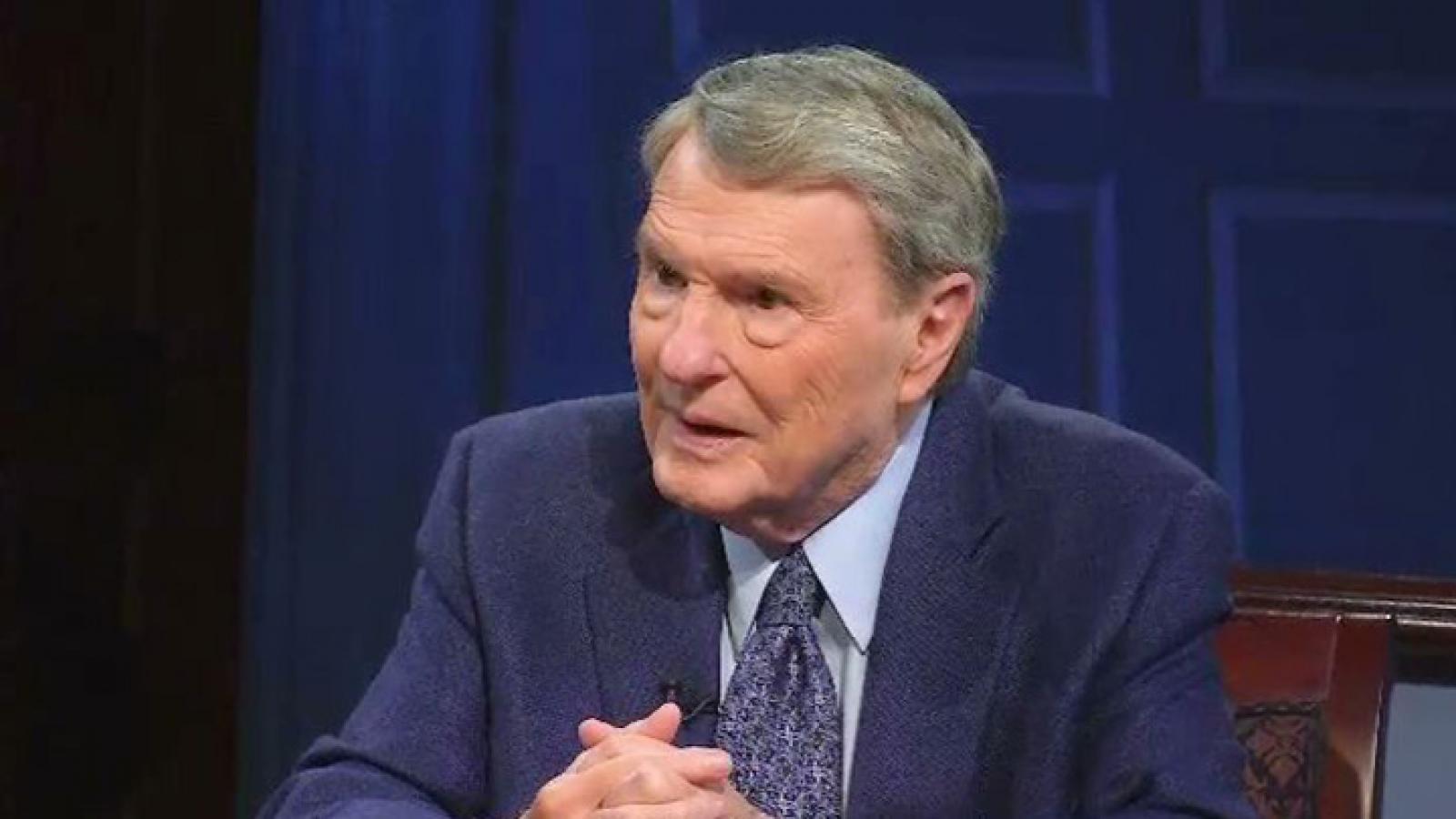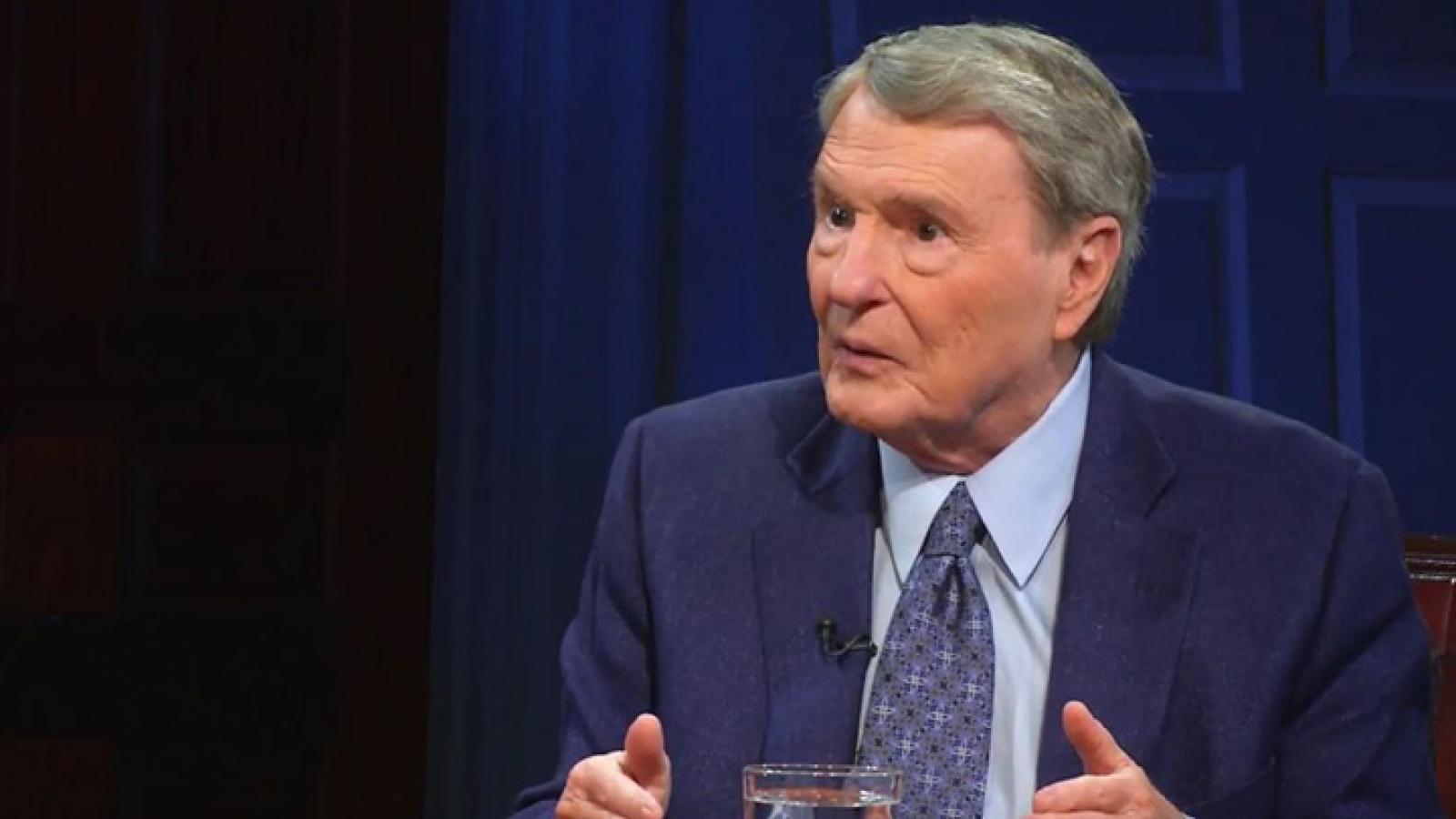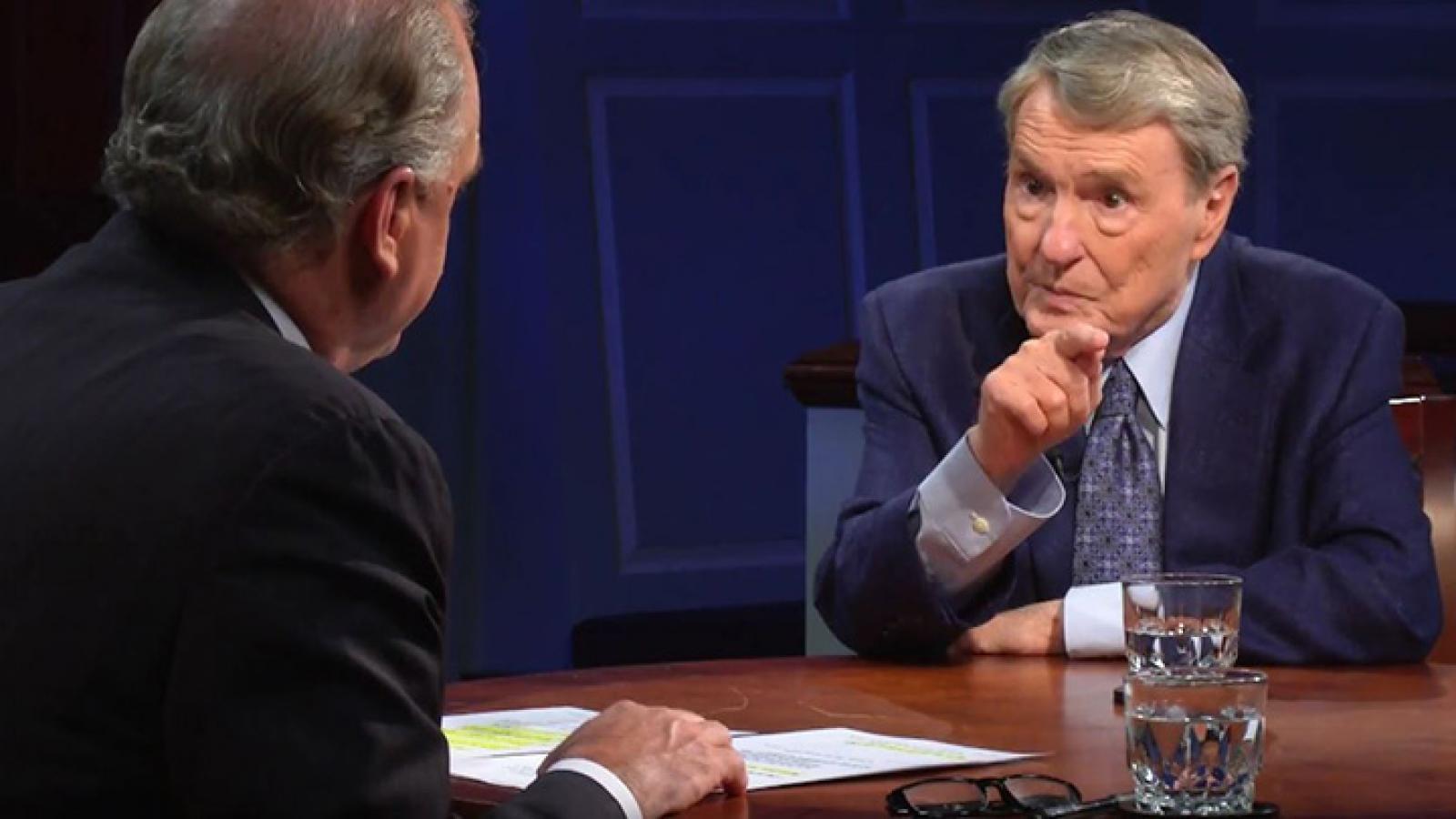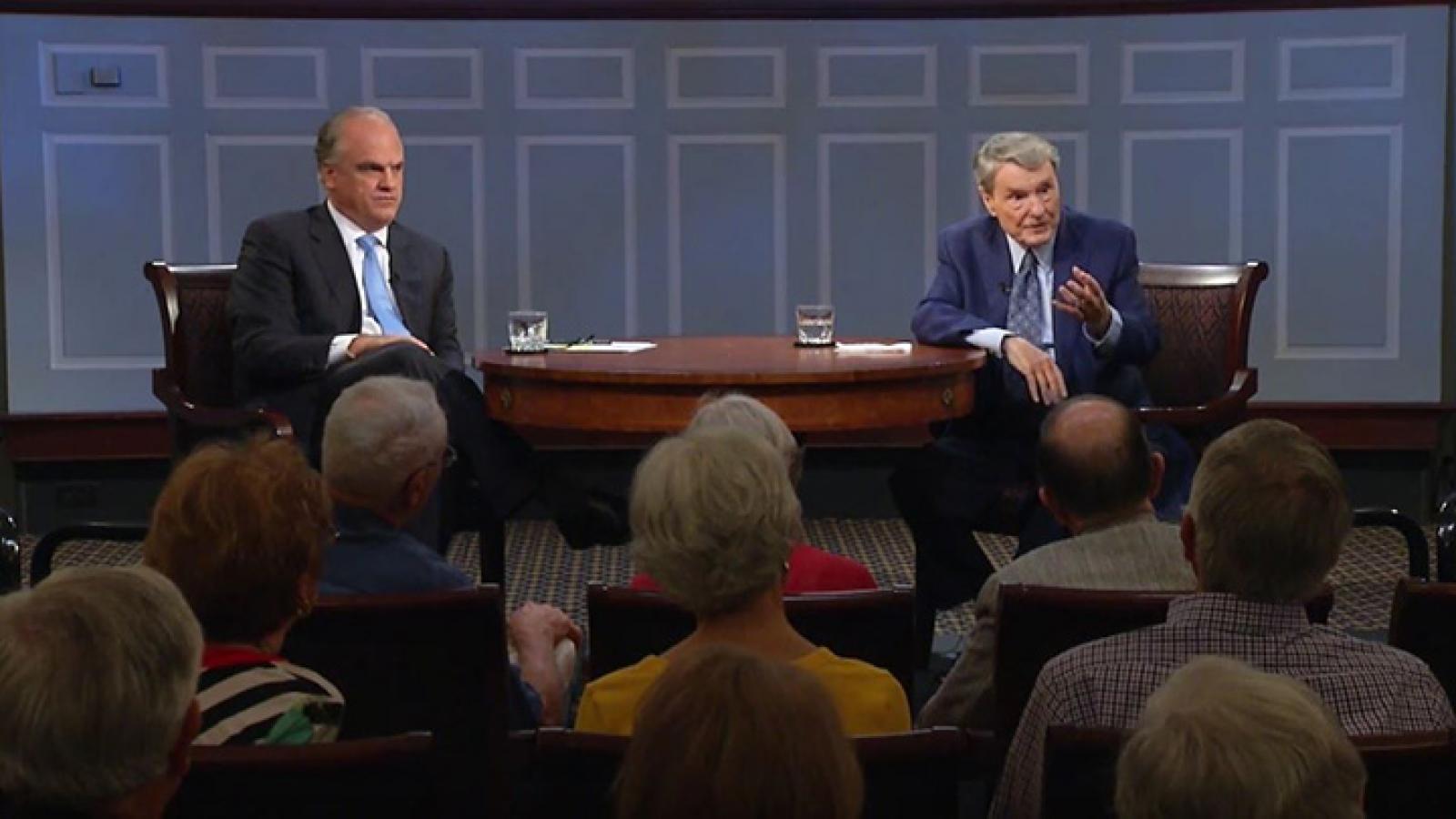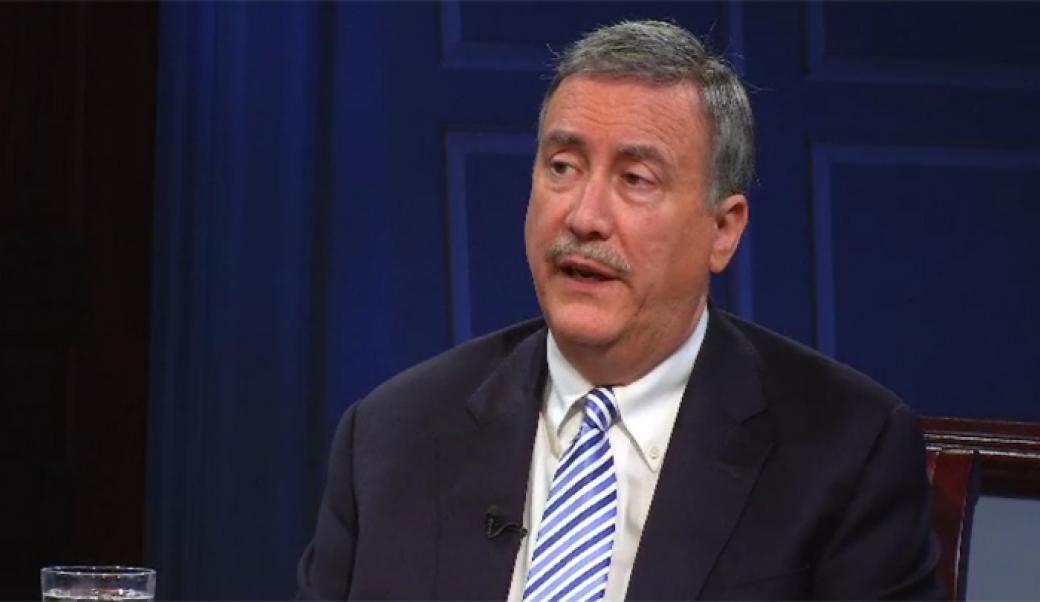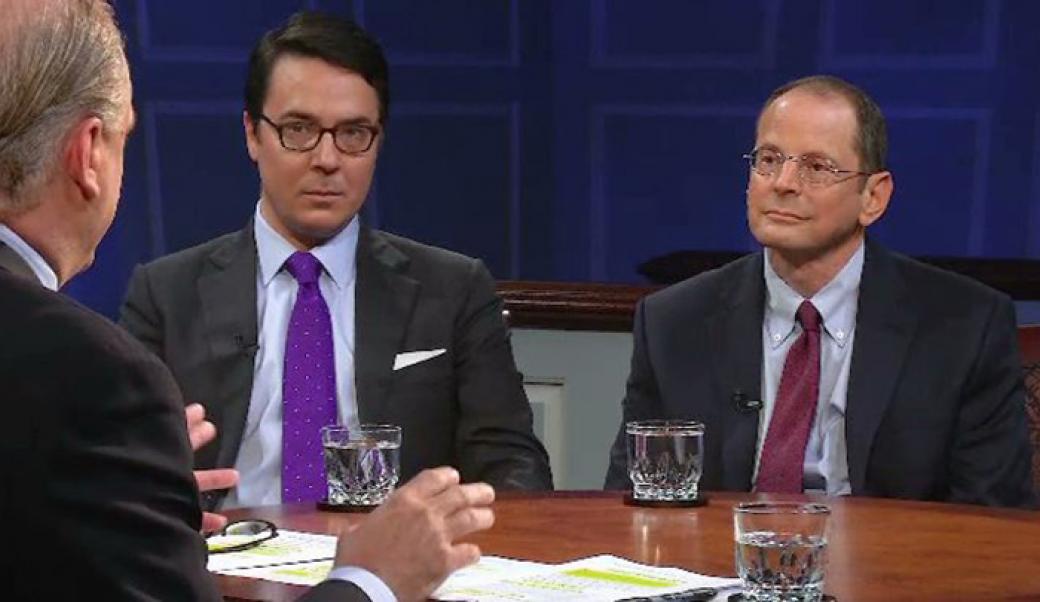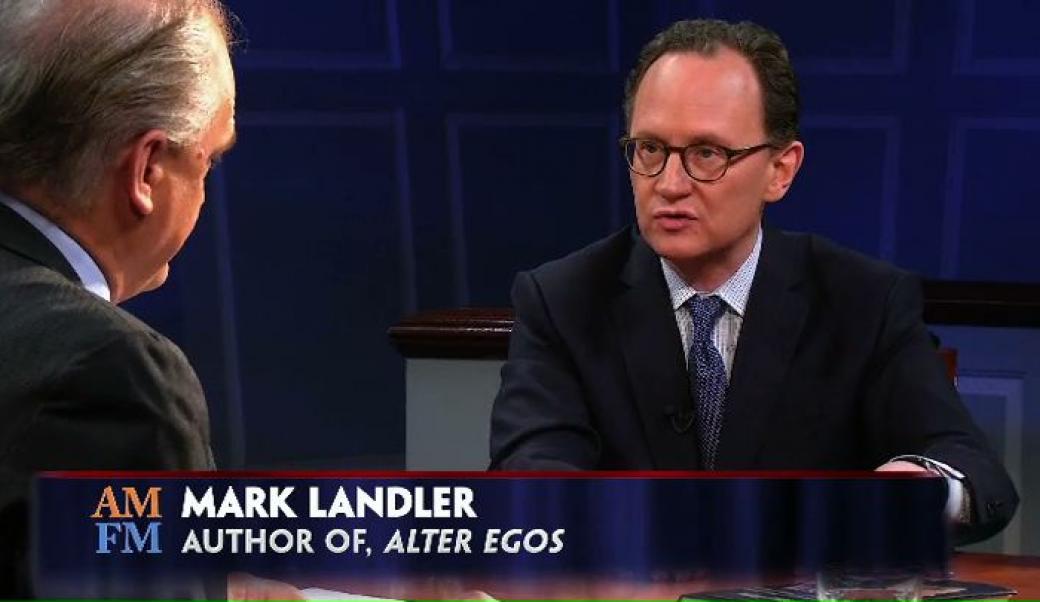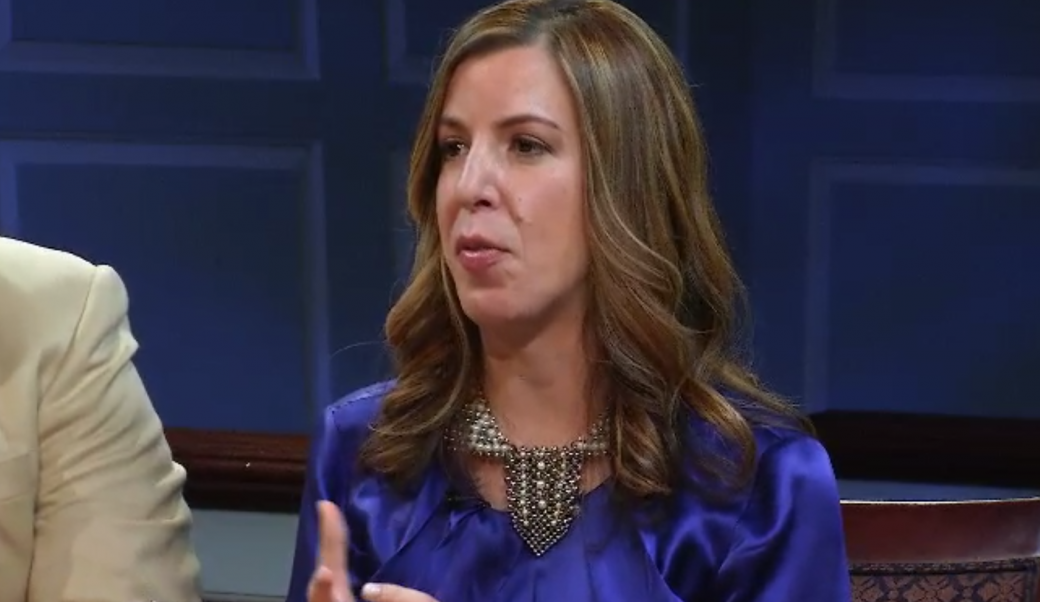About this episode
July 15, 2016
Jim Lehrer
Veteran political journalist Jim Lehrer, a member of the Miller Center's Governing Council, discusses the changing media landscape; relationships among the media, the public, and politicians; the 2016 presidential campaign; and his views on presidential debates.
Politics
A conversation with Jim Lehrer
Transcript
0:51 Doug Blackmon: Welcome Back to American Forum. I’m Doug Blackmon. The Republican National Convention gets underway this week in Cleveland, Ohio. Unless something really unimaginable has happened since we recorded this program, there’s no suspense about the GOP nominee. It will be: Donald Trump. But there are still enormous questions to be settled in a truly unique political year. For one, what does the convention—and the Party platform that Republicans will adopt this week—even matter, when the new leader of the GOP has made it clear he is beholden to no group or ideology. And many dedicated Republicans remain uncertain about Mr. Trump’s political sincerity, and whether his controversial past comments about racial minorities and woman could end up damaging their party forever. What will it take for Donald Trump to relieve those worries and truly convince his party that he has the strategy and discipline to defeat Hillary Clinton. Meanwhile, how will the media cover this coronation after months of tumultuous relations with Mr. Trump and his campaign?
FACTOID: Trump changed his political party affiliation at least five times
FACTOID: Trump has registered with GOP, Independence Party, and Democrats
FACTOID: The Question: What will happen at Trump’s GOP Convention?
Joining us in this episode to discuss those questions is a familiar face and voice to anyone who has followed American politics over the past 50 years. Former PBS anchor Jim Lehrer who has covered the most important stories in American life from the assassination of John F. Kennedy at the beginning of his career, through the Watergate hearings, the impeachment of Richard Nixon, two wars in the middle east, and the election and reelection of the first African American president. Along the way, he moderated 12 presidential debates, and authored three memoirs and 20 novels, the first one published in 1966; and the most recent, in 2013. He retired from his role as anchor and executive editor of PBS’s nightly NewsHour in 2011, and now serves on the commission organizing this year’s presidential debates. Jim, thank you for being here.
Jim Lehrer: Thank you Doug, glad to be here.
Blackmon: So we all know you, we think we know you, ah but we’ve known you as a moderator and an interlocutor and an anchor, we really haven’t known you as as a prognosticator. You’re the most trusted man in media, the heir to Walter Cronkite but we really haven’t heard you theorize much over time about politics. But now you get to if you want. So tell us what you think is the most important thing for Donald Trump to do at the Republican convention to create the highest probability for him to win the presidency four months later?
Lehrer: That’s what I call a really interesting question. The options that he has for him in terms of what he could do at the convention umm to change the potential outcome in the election itself in November are, are too numerous to mention. Ah, and a lot of it’s going to depend on what has happened between now and when that convention actually gets under way. The probable is as going into this here again using your caveat that something huge has not happened umm that the probable is that the ah Hillary Clinton will probably be elected the next president of the United States based on two things, the polling, simple polling, and the more complicated area of simple demographics of the electorate and umm ah that would be that could change etc. And that’s where you get into the possibles. It’s also possible that she could win by a huge margin. There are reports even that she could win by an historic landslide. There are also it’s also possible that umm Trump could emerge from Cleveland as a viable candidate with the full support of the Republican Party and other folks and he ends up through a set of circumstances or an events that are not related directly to the election but are elected to like a terrorist event and we’ve got those, we’ve had plenty of those. But something like that. Some monumental event that would somehow affect the outcome of the election and it could turn the probable of probability of Hillary Clinton being elected into a, a possibility of Donald Trump ah not only not losing but I mean of not of losing by a smaller margin but also he could in fact ah win.
Blackmon: If you took exactly the sequence of events that has occurred as we’ve seen it but could subtract from it a half dozen statements by Trump that were viewed by many people as having simply gone too far that on topics that seem to energize a lot of his supporters but then just went, just went several degrees way too far. If you could subtract those out that perhaps that would be a very different situation than than the one that he faces. But that he’s brought this additional trouble on. What I wonder is whether in the course of the convention is that what his primary objective should be? Somehow demonstrate that from here on out I’m not going to do any more of those, I can pull this together.
Lehrer: Yes, he might he he he would have to say some things or he doesn’t have to he might even have to say hey look, I really didn’t mean it what I said I was going to build the wall. Hey I really didn’t mean it when I said ah that Mexican immigrants that most of them are rapists. I really didn’t mean it when I said we should ah bar the immigration of Muslims. And I really didn’t mean it, I really didn’t mean it, I really didn’t mean it, I really didn’t mean it. Anybody who believes he’s really going to do that, do you know of anybody? I just don’t think that that’s realistic. I think my my my I wouldn’t call it prognostication, my observation is simply that I think Donald Trump’s going to rise or fall on who he is and what he’s already said and done. And he may continue to say and do things that upset people but he may also continue he may those things may also activate his his the people who support him um more so. So we will see. I don’t expect I would I think I think it would be a mistake to suggest oh my God we’re going to see a somebody entirely different in Cleveland up to what we’ve seen up to now. I think that is a pipe dream.
7:37 Blackmon: How big a danger to the party in the future of the party do you think this this whole moment in time may be?
Lehrer: There may be some people in the party who say that there are moral issues involved here. This is not just about politics. That the Republican Party must stand for things that are quote moral. Ah and ah ah in fact people like Paul Ryan and people have talked about that in terms of some of the things that Trump has said that go beyond politics that are simply just wrong. And umm I ah and then there’s some people who say there are some things that he’s said that are just not true. Now that’s also that’s politics but it’s also a moral issue as well. And so there are so many things ah at work that are to suggest that to say that this is a unprecedented situation ah is the understatement of of at least my time. I’ve been doing this for I’ve been doing this as you’ve said in the introduction I’ve been covering these kinds of things for for almost 50 years and I’ve never seen anything like this.
8:43 Blackmon: I heard you discuss in the past when you’ve talked about your role as a debate moderator that the things that politicians talk about when they’re running for president tends to be things like tax policy or their strategy for defense budget or international security. Those are things politicians want to talk about but the things that actually really matter and that comes out in debates and such are the unexpected things and our sense of confidence in characteristics of these candidates that are kind of detached from specific policies. In this campaign it appears that there may not be much talk about policy at all but just a lot or overwhelmingly talk about these personal characteristics by each other about one another I mean is that what you imagine?
Lehrer: I believe this will be the most personal campaign for president we’ve ever had in this country.
9:35 Blackmon: And what do you mean by that?
Lehrer: I mean that Hillary Clinton is going to do everything she possibly can to talk about Donald Trump and make Donald Trump the issue. And Donald Trump is going to do everything he can to talk about Hillary Clinton and make Hillary Clinton the issue. And we’re talking negative in both cases. And the differences over policy will come up but what will happen is I think, I may be wrong, there’s precedent for that by the way for me to be wrong.
10:10 Blackmon: Really?
Lehrer: Yeah, I know, I know.
10:12 Blackmon: I wasn’t aware of it.
Lehrer: I don’t want to get into it. Umm but it seems to me that the, the thus far that the all the emphasis is on the characters of these two people. The language that has come in out of this campaign during the primaries on the mainly on the 99.9 percent on the Republican side has been so course so ah unprecedentedly course and personal that it’s there’s no reason to to even imagine that it’s going to get any better. In fact, it’s going to get worse. There’s some people who believe this will be the nasty not only personal but the nastiness campaign.
11:02 Blackmon: Of all time?
Lehrer: Of all time. Of all time even only Thomas Jefferson and John Adams were worse to each other than these two folks are likely to be.
11:12 Blackmon: Now they turned out to be best friends later and so does that mean that Hillary and Donald Trump are going to end up best friends?
Lehrer: Yeah, that’s one I’m really not going to prognosticate on. I think that that however this election turns out however the convention turns out in Cleveland and the election itself turns out, that we’ve already suffered as a ah umm as a society for some of the things that happened and were said during this primary campaign on the Republican side and it happened to be on the Republican side and it happened and Trump was the centerpiece of it of course.
FACTOID: Sixty-two percent of Americans have unfavorable view of GOP
But there is a reason why people don’t talk in uncivilized ways because we’re a civilized society. And some of those, some of those barriers were removed publically in front of everybody, millions of people on television people talked about other people in ways that they normally don’t do that. And I mean there’s a restraint. The reason that we stop at stop signs in our cars is because we’re going to stop is because there’s a sign there that says stop and and there’s going to be if there’s not a cop there there’s going to be a picture taken of us and that restrains us. Well there’s a way to have civil discourse in our country over issues about which we disagree and umm and we’ve always done that. Yes, there are things you may think about somebody but you don’t have to say them. That’s one of the things that Hillary Clinton’s got to be careful of. Going after Trump. I mean, remember what happened to Marco Rubio in the, in the in the Republican primaries. He got hurt badly. He hurt himself permanently in ways that I don’t mean permanently politically, he just hurt himself. And that’s good, that’s a good thing in some ways that he got hurt instead of helped, and, I think. But there’s enough evidence that ah that to me at least that we’ve got some healing to do no matter what the end result of this campaign is. We as a people. We’ve got to we we we’ve got to figure out a better way to disagree. Disagreement is the heart of our democratic society and the expression of disagreement and ah disagreement and wide public ways is also at the heart of our society. But what we have now that we did not have before and what’s happened particularly on the Republican side with Trump is that we have technology, the new technology has created an amplification of everything. I mean somebody can tweet you know, you know what a tweet is?
FACTOID: Twenty-five percent of American public has negative view of both parties
14:18 Blackmon: I do actually. I do.
Lehrer: Well I’m not sure I do actually (Blackmon: I’ll explain it later.) Alright, alright. But you could tweet something and suddenly that can be on the front page of a newspaper. That can be be in 27 million blogs. That is the world the way it is and the way it is always going to be. You can’t put that one back in the bottle but we could certainly put our language and the way we had discourse and the way we do discourse and the way we disagree we can put that back in the bottle and the good bottle.
14:49 Blackmon: You’re in the business of organizing presidential debates now not conducting them yourself. And it’s important to remember that the Presidential Debates Commission that you serve on only organizes the general election debates.
Lehrer: Say that a hundred times.
15:01 Blackmon: You’re not responsible for the debates. We’ve seen so many over the past year.
Lehrer: No, no, no.
15:07 Blackmon: But particularly on the Republican side there was a lot of criticism by candidates of the debate process, specific debates and specific approaches to it. Umm umm, what did you make of that? Was that valid that the the really harsh things the candidates were saying about the process and journalists being unfair and the debates being organized in bad ways?
Lehrer: Well some of them were really awful. Some of the debates were. I watched every one of them and ah some of them were awful for for different reasons. Some of them because the questions were terrible. The questions were designed to enhance the let me show you how tough I am as a moderator type. Umm some of them ah were awful because they turned into two competing pep rallies. They let everybody scream and holler and hiss and boo and all this sort of stuff instead of keeping the audience quiet. Umm some people umm ah ah some of the debates were terrible because the candidates choose not to answer the questions. And some of these debates had 17 candidates in them and instead of organizing the debates in such a way that you have, you could have a debate with 17 candidates and you could be meaningful if you just chose one subject. And just say ok we’re going to talk for 90 minutes all 17 of you about what we’re going to do about ISIS. And that’s all. And in the process see I my belief about all of these debates including the fall debates even in the bad primary debates, you do learn something about the candidates even if the question is and some of them were kind of why do you wear blue ties? You know and if not why?
16:57 Blackmon: You don’t like my tie?
Lehrer: No I love your tie but I’m being hypothetical. That was a hypothetical question. Ah, ah but you learn something about the person and so I I’m generally in favor of all kinds of debates. But the primary debates they could be so much better. Umm but you look at it, you look at it in in in terms of what is the purpose of the primary debates? The purpose of the primary debates is to give the and whether it’s the Republican Party or the Democratic Party for the Democratic debates umm is for the Democrats in one case the Republicans in another case to choose a nominee. And the debates show in a comparative way the candidates. And so it it works. The system in quotes worked because they ended up with nominees in both cases and the debates contributed to the end result. Now, would the end result been indifferent in either case if the debates had been better there had been better debates or different debates? Who knows.
18:09 Blackmon: You were as a moderator – as the debate moderator four years ago for instance the ah I found the calculation done with the four debates four years ago ah and calculated how much time the moderator talked versus how much time the candidates talked.
Lehrer: You did that?
18:26 Blackmon: I didn’t someone else did but I found this calculation and you were the one who talked the least of the four moderators the last go round at about seven just under eight minutes of the entire was your voice and then Martha Raddatz was almost 13 minutes in the debate that she did. And the but the you’ve been praised for that for being sparse, for staying out of the way, letting the candidates talk. You’ve also been dinged at times for in the eyes of some people for being too passive. Not following them not putting the pin on someone when they were trying to slip away. But what do you say about either of those observations about the way you moderated in the past?
Lehrer: Well I think the people who praised me for what I did was correct. (Laughter) I think the people who criticized me were wrong. (Laughter)
Blackmon: Succinctly put.
Lehrer: Yeah, I, I am a big believer of the fact that the debates should be debates among or between our candidates. They shouldn’t just be formal. They shouldn’t be a fancy name for interview programs. And so many of these debates become the moderator spends all the time coming up with questions. It’s not about questions. It’s about subjects and listening and then you listen to this answer and you decide whether or not to follow up on that and whether it’s candidate A’s responsibility to say hey no no no. For a moderator to take position to try to to fact check in a debate is just very difficult. That’s not where you fact check. You fact check in an interview not in a debate, The candidates do the fact checking on each other and you facilitate it. That’s what the moderator, the best question a moderator can say is you agree with that? That doesn’t require eight hours of research you know. And I believe in that very strongly. And I have there have been one or two people who have criticized me for that.
Blackmon: And so. . .
Lehrer: They no longer exist by the way, yeah. (Laughter)
20:30 Blackmon: That’s good, I’m going to make a note of that. Umm ah keep that in mind for the future. The ah and so the debates coming this year that you’ll help to organize how will they, will they be different from what we’ve seen before? How will they reflect any of this thinking?
Lehrer: We’re still in that, we’re still in the process of working all that out. They’ve all been the dates have all been set and the locations have been set and now the details are just about how to format will go, formats will go and all of that and they show, they will be serious events. There will not be cheering and hollering by people in the audience and they will be probably and I would project, I would prognosticate ah that it’s probable that more people will watch this these debates between Hillary Clinton and Donald Trump than have watched the last three Super Bowls combined. Ah it’s going to be very very interesting.
21:37 Blackmon: Six or seven years ago in this room you said “politician for me is not a dirty word, quite the contrary. I have great respect for people who participate and offer themselves in the world of politics.” But you were you were offering a defense of the generally negative ah perception to politicians. Do you still feel exactly the same way?
Lehrer: Yes. Absolutely. Absolutely. The percentage of losers, I don’t mean technically losers but losers the way the word is used by Donald Trump say, ah the percentage of losers among politicians is about the same as it is among journalists, preachers, bankers, lawyers, doctors, whatever. And the political ah, ah political population reflects the population. And umm live with it.
22:38 Blackmon: Maybe four years ago certainly 40 years ago and certainly 20 years ago umm if a presidential candidate, any party, any circumstances had said just said even slip of the tongue accidently said ah a prisoner of war, I’m not very impressed by somebody who was a prisoner of war, I like winners not people who get captured. One line like that and you’re a veteran, one line like that would have ended almost any (Leher: Toast, toast.) previous. And I really don’t know what to make of it. Is it that there are other dimensions of Donald Trump that are so remarkable that maybe even credible maybe that are a good reason for him to be president. I’ll leave open that possibility but is it that there are these other things that are so attractive that just outweigh that that balance that out? Or is there something profoundly wrong with a large population of American people that wasn’t wrong with them not long ago?
Lehrer: Data show that of the people who voted for Donald Trump in the Republican primaries, if you add them all up it constitutes five percent of the ah eligible voters of the United States. So the fact that there were 27 candidates, you know he he he he was only at the end that he went above 50 percent. Some of those 25 percent some 30 percent whatever. And the total number of people that voted for him is small you know in terms of the total elected that is now eligible to vote this coming November. When people get all exercised about the awfulness of Donald Trump I get awful my real exercising comes over the fact that people aren’t really exercised about it. You know that they support support and not him personally but some of the things that he has said and it’s ok with them for somebody to say that and that troubles me and but I’m not convinced yet that there is a huge number of people who feel that way and we’re about to find out.
Blackmon: Jim Lehrer, it’s been an immense honor to have you. (Lehrer: The honor was mine. Thank you.) All of us at American Forum hope you’ll follow the national conventions, and continue this dialogue. That’s what we’re about—engaging with thoughtful citizens, encouraging strong opinions, and just as strong a commitment to civil, well-informed debate. We also hope you’ll join our conversation—at the Miller Center Facebook page, or by following us on Twitter @douglasblackmon or @americanforumTV. To send us a comment, watch other episodes, download podcasts or read a transcript visit us at millercenter.org/americanforum. I’m Doug Blackmon. See you next week.
